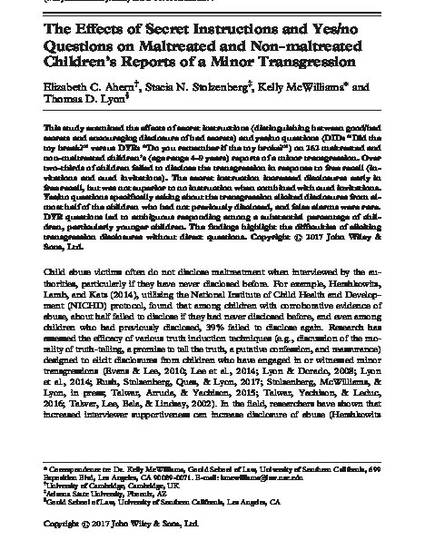
Article
58. The effects of secret instructions and yes/no questions on maltreated and non-maltreated children’s reports of a minor transgression.
Behavioral Sciences & the Law (Published 2016)
(2017)
Abstract
This study examined the effects of secret instructions (distinguishing between good/bad secrets and encouraging disclosure of bad secrets) and yes/no questions (DID: “Did the toy break?” versus DYR: “Do you remember if the toy broke?”) on 262 4- to 9- year old maltreated and nonmaltreated children’s reports of a minor transgression. Over two-thirds of children failed to disclose the transgression in response to free recall (invitations and cued invitations). The secret instruction increased disclosures early in free recall, but was not superior to no instruction when combined with cued invitations. Yes/no questions specifically asking about the transgression elicited disclosures from almost half of the children who had not previously disclosed, and false alarms were rare. DYR questions led to ambiguous responding among a substantial percentage of children, particularly younger children. The findings highlight the difficulties of eliciting transgression disclosures without direct questions.
Keywords
- child witness,
- child testimony,
- child neglect,
- child abuse,
- child sexual abuse,
- closed-ended questions,
- truth induction,
- child forensic interview
Disciplines
Publication Date
January 4, 2017
Citation Information
Ahern, E.C., Stolzenberg, S.N., McWilliams, K., & Lyon, T.D. (2016). The effects of secret instructions and yes/no questions on maltreated and non-maltreated children’s reports of a minor transgression. Behavioral Sciences & the Law, 34, 784-802.
